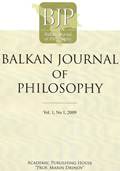The Knowledge-Based Society and the Reverse Transition from Knowledge to Information
The Knowledge-Based Society and the Reverse Transition from Knowledge to Information
Author(s): Constantin StoenescuSubject(s): Philosophy, Epistemology, Special Branches of Philosophy, Philosophy of Science
Published by: Институт по философия и социология при БАН
Keywords: information; knowledge; knowledge based society; the new mode of knowledge production; tacit knowledge; organizational knowledge
Summary/Abstract: The knowledge-based society developed technologies of information in order to make better use all the data it had acquired and to manage it efficiently. Computers have replaced human memory and improved other human capacities. However, these changes have had some hidden effects. Some information is processed by computers, and the epistemic subject is replaced by them. From an epistemological point of view, we cannot speak about the bits of knowledge that are stored, but only the semantic information or data which is attached. Secondly, in the case of an epistemic subject, the so-called tacit knowledge which is incorporated into skills and practical capacities becomes more important, and is externalized in new forms. Therefore, my claim is that we can speak of a paradoxical reverse transition from knowledge to information in the knowledge-based society.
Journal: Balkan Journal of Philosophy
- Issue Year: VIII/2016
- Issue No: 2
- Page Range: 135-142
- Page Count: 8
- Language: English

